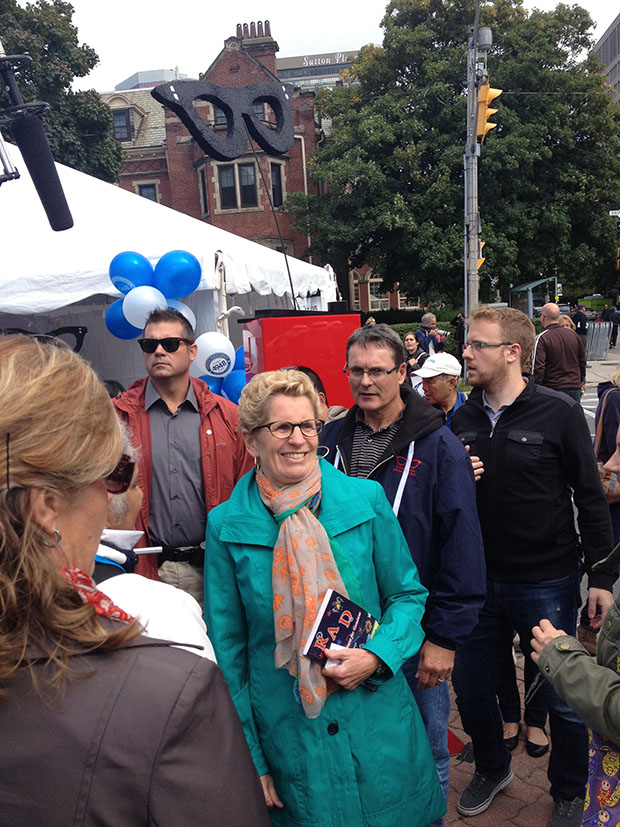By Glyn Bowerman
The Ontario Liberals seem to be gearing-up for a future election, going into a three-day party convention.
Premier Kathleen Wynne reportedly gave a speech to her minority government supporters calling the Progressive Conservative and NDP opposition parties reckless, at the annual fundraising Heritage Dinner, Thursday.
All eyes are on the forthcoming budget, which, if rejected by both opposition parties, could send Ontario into an election, testing Premier Wynne’s leadership, for the first time, in a provincial election.
For John Michael McGrath, who covers provincial politics for Queen’s Park Briefing, the speech marks a change in tone for the minority government.
“The Liberals really have shifted very much from […] portraying Kathleen Wynne as the sort of open, sunny candidate of change who is going to consult with the entire province.”
McGrath says Wynne’s speech was all about casting the opposition parties: “the Tories or the NDP, if we let them put their hands on the wheel they’re going to drive us into a ditch.”
“I would say that an election is in the 90 per cent range,” says McGrath. “I don’t think we’re at 99 per cent, there’s still the possibility that the NDP will support the Liberal budget when it arrives.”
Robert Drummond, professor emeritus of political science at York University, said in an email to Humber News, it’s not clear a spring election is inevitable.
Drummond predicts transit funding will be a budget issue, and that Wynne’s recent plan to take a gas tax and tax hike for middle-income earners off the list of possible transit funding revenue tools was an attempt to earn opposition support.
“I think Premier Wynne’s comments on transit funding are designed to give cover to [NDP leader Andrea] Horwath.”
But NDP finance critic Michael Prue isn’t persuaded.
Prue expects the budget to come in May, but says transit funding and deficit reduction should come from large corporations and high-income earners who can afford it.
“I would look to realistic and fair taxation,” says Prue.
Prue also says there is a need for dedicated funding, earmarked for specific purposes and projects.
“People will understand if you dedicate and set aside a certain amount of money that is to be used only for transit or only for infrastructure and might be more willing to pay.”
“The most reckless party in the entire legislature is Liberals and I only have to say a few words and you’ll know,” says Prue, citing various scandals like eHealth, the ORNGE air ambulance service and the gas plant cancellations that have followed Wynne from Dalton McGuinty’s tenure as premier.
For PC labour critic Monte McNaughton, supporting the budget is out of the question.
“I’ve long been on the record saying that we need to change the team that’s leading the province of Ontario,” McNaughton says.
“We can’t support a corrupt government.”
McNaughton says his party is ready to run on its job creation plan to boost Ontario’s flagging manufacturing sector.
For Robert Williams, professor emeritus of political science at the University of Waterloo, Wynne’s government is trapped between promises made, and political pressure from Tim Hudak’s Tories to hold the line on, or roll back taxes.
“I can’t see how you’re going to be able to square that circle – to do all the things they want to do, and still not change the tax levels. Cause if they do, then they’re gonna get hammered.”
Williams says the Liberals will never be able to win PC support, and if there are new votes to be had, they are former NDP voters who could be coaxed over.
McGrath agrees, saying the recent Liberal focus on GTHA transportation funding is an attempt to win-over NDP-held urban ridings.
“The Liberals want to be able to go to, especially, 416, Toronto voters,” says McGrath.
“They want to be able to go into Parkdale-High Park, and into Beaches-East York, and Toronto-Danforth and Davenport and say ‘you are currently represented by an NDP member who voted against a budget with a transit funding mechanism that they say they support.’”
That said, Drummond writes there is a risk involved in an imminent election the NDP may not be willing to take.
“If the polls tell the NDP that they will make few gains if any and that the PCs might form a government, an election might be held off,” writes Drummond.
However, he says the NDP – who have allowed the previous two minority budgets to pass – may not be able to continue doing so, without taking some damage.
“The more times the NDP shores up the Liberals, the more people may conclude that a vote for the NDP is a less direct way of voting Liberal,” something Drummond says would be bad for Andrea Horwath’s NDP.
In some ways, McGrath says, a minority government in Ontario has been good for the province – forcing some consensus to be reached on previous budgets, if grudgingly, and keeping the committee process from being an empty observance.
That said, McGrath says Wynne’s Liberals will eventually have to seek their mandate from Ontario voters.
“She does need to go to the voters at a certain point, and I suspect they feel like they’ve put enough of the bad stuff of the McGuinty years behind them that they aren’t going to get a better shot.”



